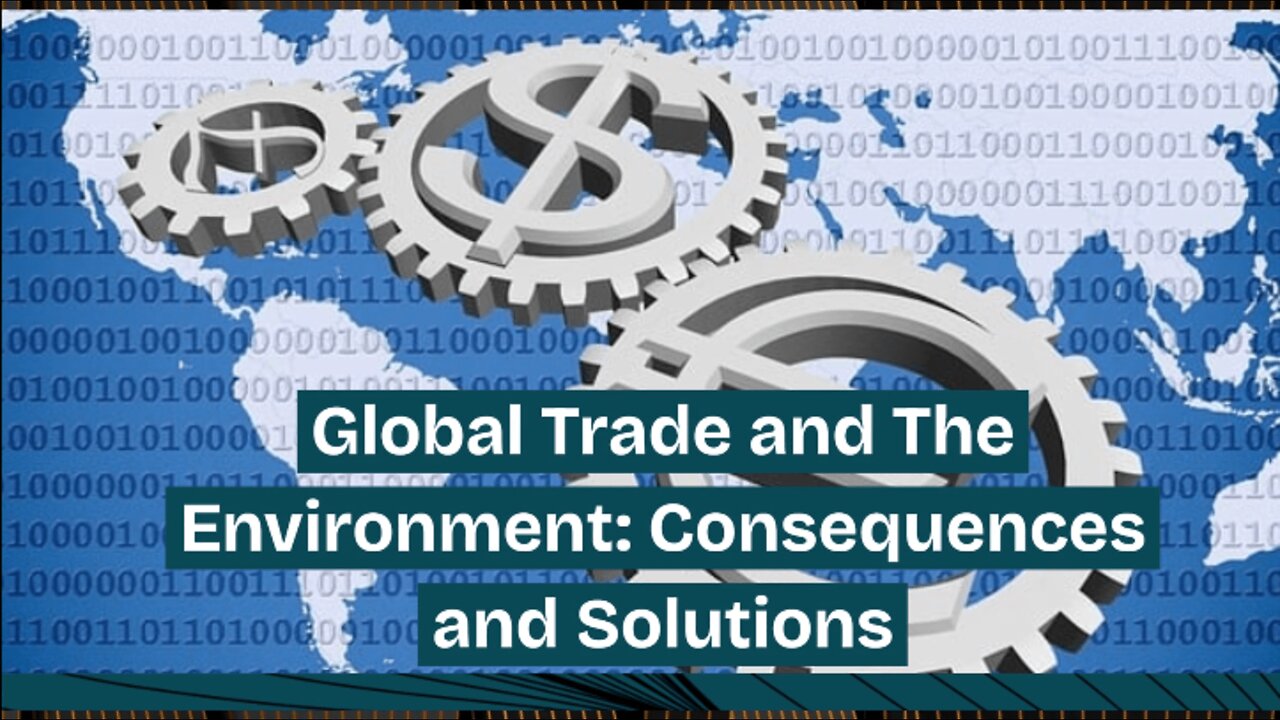Premium Only Content

The Hidden Toll: How International Trade is Destroying our Environment
ISF Solution | (832-904-9333)
clearance@isfsolution.com | www.isfsolution.com
In today's video, we delved into the topic of how international trade impacts the environment. We discussed several key areas where trade has environmental consequences, including air pollution, deforestation, plastic waste, water pollution, and social issues related to workers' rights and safety. These consequences highlight the interconnectedness between economic growth and environmental degradation, requiring us to find sustainable solutions that balance both.
One of the significant ways international trade affects the environment is through air pollution. The transportation of goods across long distances emits greenhouse gases and other pollutants, contributing to global warming and air pollution. Deforestation is another consequence of trade, as demand for products like timber, palm oil, and soybeans leads to habitat loss, reduced biodiversity, and increased carbon dioxide levels. The issue of plastic waste is also concerning, as inadequate waste management systems result in a significant amount of plastic ending up in our rivers and oceans, posing a severe threat to marine life and ecosystems.
Furthermore, international trade contributes to water pollution through industrial discharge of harmful chemicals and waste. This pollution affects local ecosystems and can contaminate drinking water sources for nearby communities. Additionally, the transportation of goods by sea can lead to oil spills and other accidents, further polluting our oceans. Lastly, the impacts of trade extend to social aspects, such as workers' rights and safety, as some workers face unsafe conditions and inadequate pay in pursuit of meeting international demand.
However, it is essential to recognize that there are opportunities for positive change. Renewable energy technologies and sustainable practices can be adopted in transportation, manufacturing, and packaging industries to reduce emissions and minimize waste. Investing in green technologies and promoting eco-friendly trade practices can help mitigate the negative consequences of trade on the environment.
In conclusion, international trade has significant environmental impacts, from air and water pollution to deforestation and plastic waste. It is crucial for us to understand these consequences and work towards sustainable solutions that balance economic growth with environmental protection. As consumers, we can make a difference by supporting companies that prioritize sustainability. Thank you for watching our video, and be sure to subscribe to our channel for more content on customs brokerage and related topics.
#usimportbond
#isfcustomsbroker
#uscustomsclearing
#isfentry
PT8730
00:39 International trade impacts the environment through air pollution caused by the transportation of goods across long distances using various modes of transport like ships, planes, and trucks, emitting greenhouse gases and pollutants.
01:08 Deforestation is a significant environmental consequence of international trade as demand for products like timber, palm oil, and soybeans leads to habitat loss, reduced biodiversity, and increased carbon dioxide levels.
01:36 Plastic waste is a pressing environmental challenge associated with international trade, with a large amount of plastic products ending up in rivers and oceans due to inadequate waste management systems, posing a threat to marine life, ecosystems, and human health.
02:11 International trade also contributes to water pollution through industries discharging harmful chemicals and waste into water bodies, as well as accidents like oil spills from the transportation of goods by sea, impacting local ecosystems and drinking water sources.
-
 1:03:41
1:03:41
Man in America
19 hours agoAre Trump & Musk the COUNTER-ELITES? w/ Derrick Broze
93.8K81 -
 3:45:08
3:45:08
DLDAfterDark
10 hours ago $11.85 earnedDLD Live! SHTF Handguns! Which Would You Choose?
50.8K4 -
 1:50:38
1:50:38
Mally_Mouse
12 hours agoSaturday Shenanigans!! - Let's Play: Mario Party Jamboree
60.1K -
 1:13:00
1:13:00
Patriots With Grit
16 hours agoWill Americans Rise Up? | Jeff Calhoun
49.9K13 -
 14:55
14:55
Exploring With Nug
17 hours ago $11.85 earnedWe Found Semi Truck Containers While Searching for Missing Man!
65K9 -
 27:57
27:57
MYLUNCHBREAK CHANNEL PAGE
1 day agoOff Limits to the Public - Pt 3
151K70 -
 38:07
38:07
Michael Franzese
17 hours agoLeaving Organized Crime and Uncovering Mob in Politics: Tudor Dixon and Michael Franzese
116K15 -
 2:42:54
2:42:54
Jewels Jones Live ®
2 days agoAMERICA IS BACK | A Political Rendezvous - Ep. 111
90.7K50 -
 8:47:33
8:47:33
Due Dissidence
1 day agoLIVE: Workers Strike Back Conference ft. Chris Hedges, Jill Stein, Kshama Sawant, and More!
126K92 -
 8:36:37
8:36:37
Right Side Broadcasting Network
5 days agoLIVE REPLAY: CPAC 2025 Day Three with President Donald J. Trump - 2/22/25
476K104